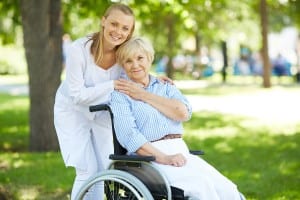 Returning home from the hospital can be a traumatic experience for the elderly for many reasons. In most cases the patient has been 100% dependent on hospital staff and the transition to life with less help at home can be a challenge. Assistance may be needed in the home because the elderly person may need help or supervision with certain activities. While many people can provide a certain amount of care themselves, they may need assistance part time or with certain tasks. The need of a registered nurse may also be necessary.
Returning home from the hospital can be a traumatic experience for the elderly for many reasons. In most cases the patient has been 100% dependent on hospital staff and the transition to life with less help at home can be a challenge. Assistance may be needed in the home because the elderly person may need help or supervision with certain activities. While many people can provide a certain amount of care themselves, they may need assistance part time or with certain tasks. The need of a registered nurse may also be necessary.
In the case of a fall in the home that leaves a person with hindered mobility, assistance with moving a patient and catering to their needs is essential, and can help to prevent additional injuries. Each year one out of every three older adults (aged 65 or older) falls. Falls are the leading cause of death for people 65 or older. The good news is that many falls are preventable. The elderly should exercise when possible to increase balance and leg strength, have vision checked periodically, and safeguard their homes from falling hazards. Some medications do not work well together and can increase the likelihood of falling.
Alzheimer’s patients might need assistance in tasks such as cooking, bathing, dressing, as well as supervision and all around care. 5.2 million people over the age of 65 in the US have Alzheimer’s, and 70% of those people are cared for at home.
Stroke victims may need help with day-to-day tasks. 40% of all stroke victims will fall in the home within a year of the stroke. Over 750,000 Americans suffer from stroke each year. It is the fourth most common cause of death. On average, a stroke occurs in America every 40 seconds. Stroke victims can develop dysphagia, which makes it harder to swallow. With dysphagia, victims may inhale food/drink into the lungs and airways, causing asphyxiation. Pneumonia can develop from this as well. Speech-language pathologists should evaluate the victims ability to swallow and talk. Rehabilitation should be considered for stroke victims, as they will need to restore muscle function and strength for everyday tasks. For these reasons qualified supervision is prudent.
When returning from the hospital the addition of certain items can make home care easier. The installation of a portable toilet containing a bucket, grab-rails, and raised seat in the bedroom can make things accessible. Moreover, the use of adult diapers can help alleviate accidents. When taking a shower or bath, make sure the levers or knobs are clearly labeled and elongated for easy use. Additionally, rubber mats in the shower as well as shower chairs can help prevent falls. For the main bedrooms insert a light switch or lamp near the bed to illuminate the room to prevent falling in the dark. If you are using the stairs in your home, install and check the handrails annually. Furthermore, if you use the stairs multiple times in the day, consider adding a stair-lift inside your home. Lastly, all of these excellent items can make home care easier for you and your loved one.
For more information contact Safe Harbor at (718)-979-6900
